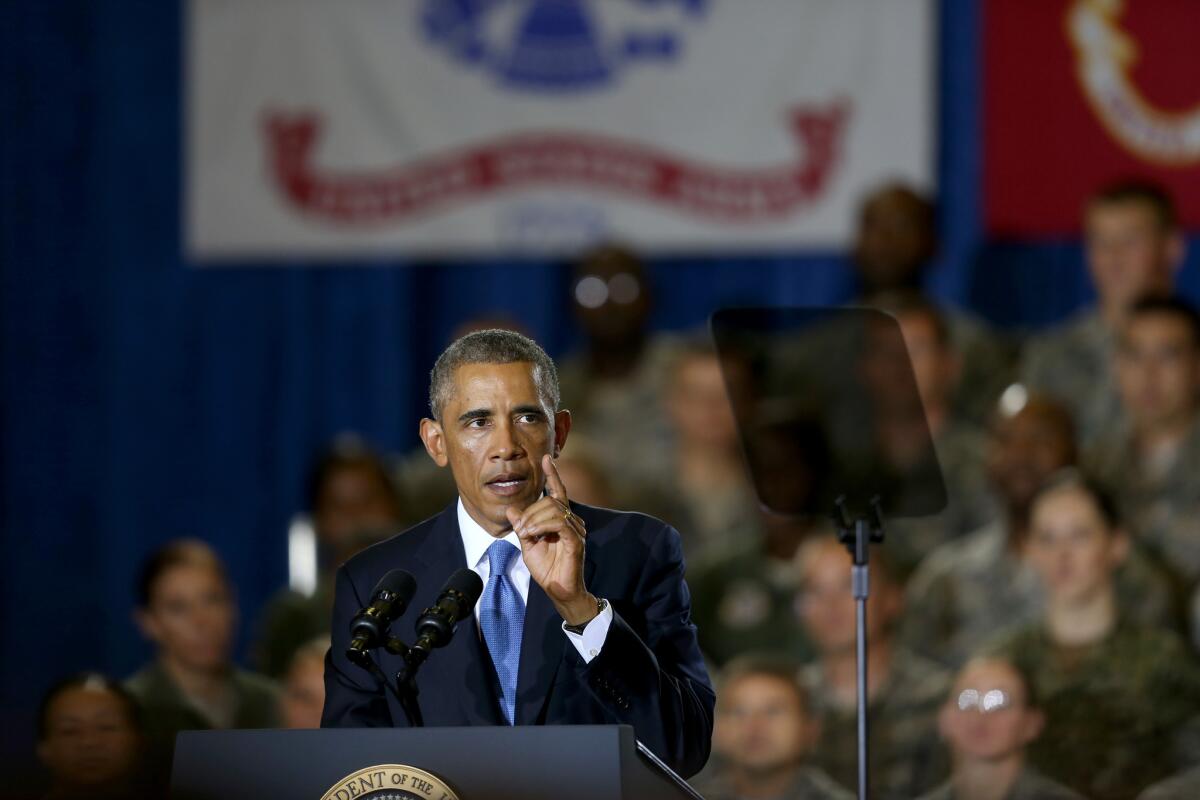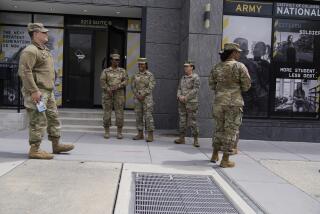Obama reiterates that U.S. forces have no ‘combat mission’ in Iraq

Emphasizing the American military’s unrivaled expertise, President Obama thanked service members Wednesday and repeated that U.S. forces taking on the Islamic State militant group would not serve in combat, a day after his top general repeatedly raised that prospect.
American forces “do not and will not have a combat mission,” Obama told troops at the U.S. Central Command headquarters here. “They will support Iraqi forces on the ground as they fight for their own country against these terrorists.”
He made that pledge a day after Gen. Martin Dempsey, the chairman of the Joint Chiefs of Staff and the military’s top officer, described for a Senate panel the challenges of fighting the militants without combat troops on the ground.
“If we reach the point where I believe our advisors should accompany Iraqi troops on attacks against specific ISIL targets, I’ll recommend that to the president,” Dempsey said Tuesday, using an alternate acronym for the extremist group.
Obama has repeatedly said that the U.S. strategy would not involve troops on the ground. That policy, however, allows him room to maneuver. He’s already authorized 1,600 troops to advise and train Iraqi forces, and White House officials have not ruled out the possibility that that number may grow.
Obama also deliberately has specified that U.S. combat troops would not be deployed to “fight” -- a distinction that allows for the possibility that U.S. special forces might be used in a rescue mission, as was the case this summer in the failed attempt to retrieve U.S. hostages being held by Islamic State militants in Syria.
At Central Command, Obama cited the U.S. military’s expertise and indicated it would be better used in the strategy he has laid out, as the leader of a coalition of nations committed to fighting the extremists.
“As your commander in chief, I will not commit you … to fighting another ground war in Iraq,” he said. “After a decade of massive ground deployments, it is more effective to use our unique capability in support of partners on the ground so they can secure their own countries’ futures.”
He listed the commitments other nations have already made, asserting that more than 40 have offered help for the broad campaign.
France and Britain are “flying with us over Iraq,” he said, and Saudi Arabia has committed to host training for regional fighters.
Australia and Canada will send military advisors to Iraq, Obama said, and German paratroopers will assist in training.
“Arab nations have agreed to do what they can to strengthen Iraq’s government,” he said, and others have agreed to help “stem the flow of foreign fighters into and out of” the region.
Obama is expected to ask the United Nations Security Council to commit to that goal when it meets next week.
In the wake of the Dempsey comments, though, some analysts argued that Obama’s strategy was actually too military in nature. Defeating the extremists requires a strategy that emphasizes diplomacy, intelligence and economics, said Jon B. Alterman, director of the Middle East program at the Center for Strategic and International Studies.
Those tools aren’t as easy to see in the short term, said Alterman, but “they present the only path to victory: crippling the organization’s networks, denying the group safe haven and undermining the conditions that make it attractive to potential recruits.”
“While the Obama strategy is more than merely a military strategy, it appears militarily focused,” Alterman wrote in an email Wednesday. “The president’s speech on Iraq and Syria focused on military instruments, and used the language of the military, twice promising to ‘degrade and destroy’ the Islamic State. Perhaps the president was seeking to capitalize on the urgency of this month’s murders, and only military instruments seemed urgent enough.”
“As Gen. Martin Dempsey suggested before the Senate, they may beget even more military action,” he said. “Military instruments are enough to fight, but in this battle, they are not nearly enough to win.”
During a week of events meant to bolster Obama’s foreign policy credentials with the public, the White House also saw evidence of the challenges facing the president as he tries to help fellow Democrats keep control of the Senate in the fall elections. A New York Times/CBS News poll out Wednesday showed his approval ratings on par with those of Republican President George W. Bush near the 2006 midterms -- when Democrats swept both houses of Congress.
Recent opinion research has suggested growing support among Americans for a more aggressive U.S. military posture, as Obama is prescribing.
But the latest poll raises questions about whether that translates into support for the president himself. The poll’s 34% approval rating for his handling of foreign policy is a record low for him, though it isn’t as low as Bush’s eventual low of 25%.
And Obama’s 41% rating for his handling of terrorism is lower than any score on that issue for both him and his predecessor.
On Wednesday, the president reiterated the parts of his strategy to take on the militants that have drawn criticism and insisted that the old way of fighting in the Middle East will not work.
“When we do things alone, and the people of those countries aren’t doing it for themselves, as soon as we leave we start getting the same problems,” he said. “We’ve got to do things differently.”
For more coverage of the president, follow @cparsons
More to Read
Start your day right
Sign up for Essential California for news, features and recommendations from the L.A. Times and beyond in your inbox six days a week.
You may occasionally receive promotional content from the Los Angeles Times.







